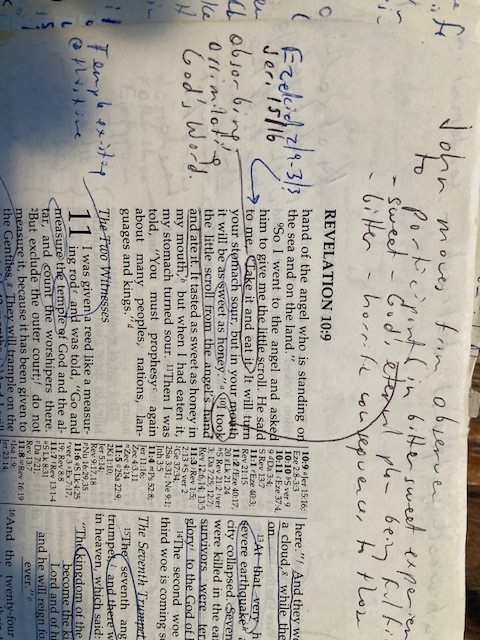
Eating the Word – Part 2
Then the voice that I had heard from heaven spoke to me once more: "Go, take the scroll that lies open in the hand of the angel who is standing on the sea and on the land." So I went to the angel and asked him to give me the little scroll. He said to me, "Take it and eat it. It will turn your stomach sour, but in your mouth it will be as sweet as honey." I took the little scroll from the angel’s hand and ate it. It tasted as sweet as honey in my mouth, but when I had eaten it, my stomach turned sour (Revelation 10:8-10).
The Word of God
is essential sustenance to the child of God, and as such is often symbolized by
images of food:
Matthew 4:4 - Jesus answered, It is written: ‘Man does not live on bread alone, but on every word that comes from the mouth of God.’
1 Peter 2:2 - Like newborn babies, crave pure spiritual milk, so that by it you may grow up in your salvation…
Hebrews 5:12 - …teach you again which be the first principles of the oracles of God; and are become such as have need of milk, and not of strong meat.
Psalm 119:103 - How sweet are your words to my
taste, sweeter than honey to my mouth!
The Bible is to be ingested by the child of God for growth, strength, resilience, spiritual health. Only by “eating” can we infuse it into our DNA, influencing words, thoughts, actions and reactions, attitudes, and character.
And yet, John’s experience in Revelation 10 (above) was double-edged: what was sweet in his mouth was sour in his stomach.
Therein lies the caveat lector – let the reader beware – of reading the Word of God.
The immediate contextual interpretation deals with what was to follow in John’s visions. But a second application is possible.
Because we live
in an era of profound “truth decay”, the Bible and its unbending standards of righteousness cause us great indigestion to the extent that our lives do not measure up. The Spirit uses the Scripture to speak to our lives. The iconic Reformation figure Martin Luther referred to the Word as the mirror of God’s Word showing us in stark and sometimes ugly but accurate detail, the graphic reality of our own sin.
Additionally, the Bible has all the answers but raises many uncomfortable - and explicitly unanswered – questions.
But this fact remains: the Bible is how
the Lord has primarily chosen to speak to a desperate and darkening world.
Consider the following:
“It is the most quoted, the most published, the most translated, the most influential book in the history of the humankind” (Norman Geisler & William Nix).
“What you meet is a total view of God and the world, that is, a total theology, which is both an ontology, declaring what there is, and an epistemology, stating how we know what there is” (J.I. Packer).
“The Christian who is not diligently involved in a serious study of Scripture is simply inadequate as a disciple of Christ…The biblically illiterate Christian is not only inadequate but unequipped” (R.C. Sproul).
“Obviously, the exclusiveness of the Bible’s message invites a challenge to its authority” (Dr. Bill McRae).
“Therefore, Scripture is the highest and the supreme authority on any matter on which it speaks” (John MacArthur).
Takeaway: At Bethel, we are committed to a Diet of God’s Word.
But note the admonition of Bible teacher Warren Wiersbe: “God will not thrust His Word into our mouths and force us to receive it. He hands it to us and we must take it. Nor can He change the effects the Word will have in our lives: there will be both sorrow and joy, bitterness and sweetness. God’s Word contains sweet promises and assurances, but it also contains bitter warnings and prophecies of judgment. The Christian bears witness of both life and death (2 Cor. 2:14–17). The faithful minister will declare all of God’s counsel (Acts 20:27). He will not dilute the message of God simply to please his listeners (2 Tim. 4:1–5).”
~ this post last appeared in December 2022